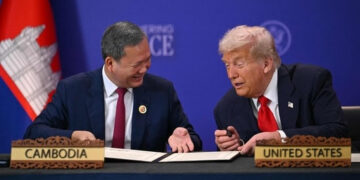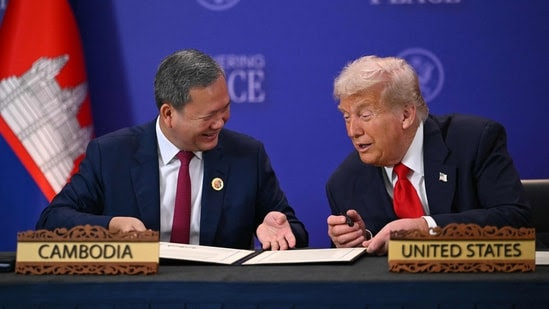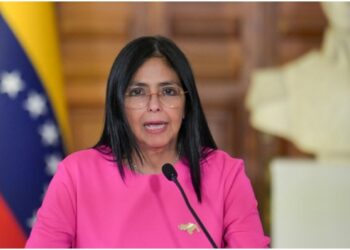By Enyichukwu Enemanna
Prime Minister of Cambodia, Hun Manet has nominated the United States President Donald Trump for the Nobel Peace Prize, recognising his role in brokering the historic Kuala Lumpur Peace Accords signed between Cambodia and Thailand on Sunday.
Speaking at the signing ceremony, Hun said the nomination represents “the gratitude of the Cambodian people” for Trump’s leadership in achieving lasting peace between the two neighbouring countries after years of border tension.
“Recognising your unwavering dedication and resolute efforts to promote peace, not only between Cambodia and Thailand but also among other nations, and reflecting the gratitude of the Cambodian peoples, I have nominated President Donald Trump for the Nobel Peace Prize,” Hun said.
“Peace saves lives, and this is the heartfelt wish of our people,” he added.
Hun also thanked Malaysian Prime Minister Datuk Seri Anwar Ibrahim for his mediation efforts as ASEAN Chair, calling Malaysia’s role “pivotal” in guiding both sides towards a final agreement.
Trump attended the signing ceremony alongside Anwar and Thai Prime Minister Anutin Charnvirakul.
Both Southeast Asian leaders praised the US leader for his personal involvement in encouraging the two nations to reach an amicable settlement.
The Kuala Lumpur Peace Accords formally end years of sporadic clashes along the Thai–Cambodian border, marking one of the most significant diplomatic achievements under ASEAN’s leadership in recent years.
Trump had earlier in the month lost the bid for the 2025 Nobel Peace Prize to Venezuela’s opposition leader and democracy activist Maria Corina Machado.
Trump since January when he returned to the White House for second term has repeatedly insisted that he “deserves” the Nobel for his role in resolving numerous conflicts, including the ceasefire deal between Israel and Gaza.
Analysts have however faulted Trump’s claims, saying they are broadly exaggerated.
In the run-up to the announcement of Machado, Nobel Prize experts in Oslo had insisted that Trump had no chance, noting that his “America First” policies run counter to the ideals of the Peace Prize as laid out in Alfred Nobel’s 1895 will which sets up the award.



































